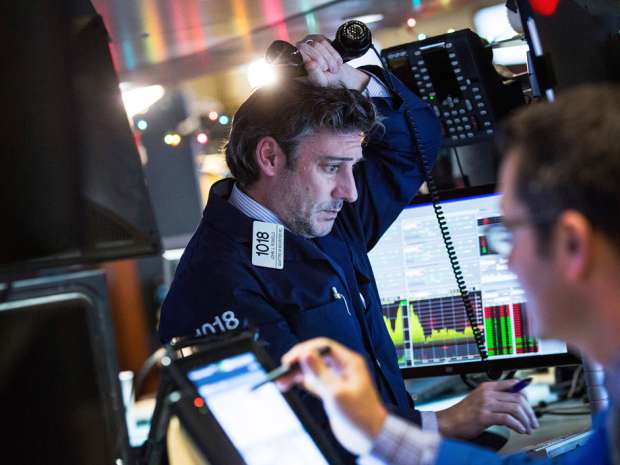Markets get off to a terrible start for 2016, as fears over China’s economy spark global rout
Global investors around the world fled from risk as a steep drop in the Chinese stock market renewed fears that the country’s economic malaise may spread to the rest of the world.
China’s CSI 300 index — which tracks the 300 largest companies listed in Shanghai and Shenzhen — fell 6.9 per cent in intra-day trading before a circuit-breaker was activated, halting all trading. Even with the halt, this was the worst ever start to a year for Chinese stocks.
Global markets responded to the events in China by selling off heavily. The Dow Jones Industrial Average fell by 276.09 points, or 1.58 per cent, to 17,148.94. The S&P/TSX Composite Index fell 82.80 points, or 0.64 per cent, to 12,927.15. It was the worst first day of trading during a new year for global stocks in at least three decades.
The selloff mirrored a similar global shock experienced in August, when a shock devaluation of China’s currency and worries over the health of its economy resulted in a market crash that sent policy makers there scrambling to contain the crisis.
“Market participants still seem to expect a lot from China and that worries me a little bit,” said Sadiq Adatia, chief investment officer at Sun Life Global Investments. “The quicker the market can absorb and understand that China has developed more, and as such, its growth is going to come down. Then we’ll have less of these big volatile days.”
The selloff happened after the release of the Caixin China Manufacturing PMI Index, which showed Chinese industrial output shrank in December. The index registered a reading of 48.2 in December, well below the 50 reading that designates that manufacturing is growing.
The yuan retreated sharply on the data, briefly falling to a five-year low against the U.S. dollar.
Market jitters are heightened around China at the moment because the country will soon end a selling ban imposed on major stockholders. Beijing put the ban in place last August, when the Chinese stock market experienced a rapid crash that triggered a global stock rout.
Some analysts said that the trading halt exacerbated China’s selloff. Under new rules, which were announced in December and went into effect Monday January 4th, trading in stocks is halted for 15 minutes when prices fall five per cent or more. After trading resumes, if stocks fall further, they are halted for the remainder of the day, as occurred Monday once losses reached 6.9 per cent.
The new system was put into place by policy makers as a way to prevent the type of crash that panicked much of the world in August, when the value of stocks on the Shanghai and Shenzhen stock markets plunged 20 per cent in just four days.
Given the widespread fear in the market at the moment, combined with disappointing economic growth from some of the world’s major economies, including China, some analysts said that the first trading day of the year could be a sign of what to expect for the rest of the month.
“It’s evident that the combination of a tightening Fed and a weak global growth backdrop will prove to create a difficult, volatile trading environment for at least the first few weeks of the year,” said Christopher Vecchio, currency analyst at DailyFX.
A weak first trading day does not necessarily signal another bad year for investors, who are recovering from the disappointing performance of stocks and bonds in 2015. The Stock Trader’s Almanac notes that the first trading day of the year had little correlation with how the rest of the year performance.
The idea of the January Effect, however, was a better indicator. The S&P 500’s annual performance tended to mimic its performance in January 75 per cent of the time.
But some analysts say that Monday’s steep selloff may be only a temporary blip, and that stocks, in China in particular, will soon begin recovering again.
“We expect fears about China’s economy to recede and the slump in commodity prices to end,” said Julian Jessop, chief global economist at Capital Economics. “We doubt tighter Fed policy will rattle equities either.”
Article Written By: John Shmuel
0

